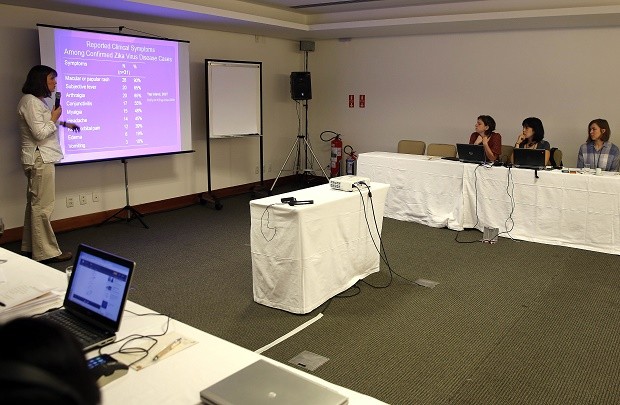CDC team in Brazil to study possible Zika link to defect

Dr. Erin Staples from the United States’ Centers for Disease Control and Prevention (CDC) speaks before members of Brazil’s Health Ministry and the Paraiba state’s health secretariat in Joao Pessoa, Brazil, Monday, Feb. 22, 2016. A 16-member team of the US Centers for Disease Control and Prevention is starting work on a “case-control” study aimed at determining whether the Zika virus really does cause babies to be born with the devastating birth defect microcephaly, as Brazilian researchers strongly suspect. AP
JOAO PESSOA, Brazil — A 16-member team from the US Centers for Disease Control and Prevention kicked off work Monday on a study to help determine whether the Zika virus really does cause babies to be born with the devastating birth defect microcephaly, as Brazilian researchers strongly suspect.
Brazil’s health minister has repeatedly said he’s sure that Zika is causing the birth defect but international health agencies say there is not enough evidence to be certain.
“We have very limited information and we want to get more,” Cynthia Moore, a microcephaly expert with the CDC, said at a training session in the capital of the northeastern state of Paraiba, one of the epicenters of Brazil’s tandem Zika and microcephaly outbreaks.
She said “evidence is mounting” for a causal link between Zika and microcephaly, but myriad questions remain about how the virus may affect fetuses, the magnitude of the risk of infection and whether other factors may in involved.
Eight teams from the CDC, the Health Ministry and the state health secretariat will search the state for babies with microcephaly and their mothers. They hope to recruit more than 100 mothers of babies with microcephaly and compare their blood work and other data with that of several hundred mother and babies without microcephaly born in the same areas around the same time.
READ: Can scientists prove Zika virus is causing birth defects?
Data collection is expected to last several weeks, researchers said, depending largely on how easily they can track down the babies with microcephaly and their families, many of whom are thought to live in remote rural areas of Paraiba, one of Brazil’s poorest and least developed states.
While 56 cases of microcephaly have been confirmed in Paraiba since the spike was first noticed in October, authorities are investigating another 423 suspected cases, according to Health Ministry data.
“There’s a lot of anxiety out there and people really want to understand what’s going on,” said Priscila Leite, who leads the Heath Ministry’s delegation. “We expect high recruitment numbers.”
It’s not yet clear how long it will take for results to be released, but Erin Staples, the epidemiologist who heads the CDC contingent in Paraiba, said partial results may emerge during the monthlong data collection phase.
READ: As Zika rages in the Americas, should Asia be worried?